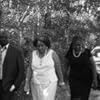
A Goodreads user
asked:
I am reading Americanah, and I'm about half way through. If, for the protagonist, Nigeria is 100 % good, and the USA is 100% bad, why come to the States?
To answer questions about
Americanah,
please sign up.
Nancy Vegas
Laura, you know you don't really want an answer to your very rude question. As an immigrant and now citizen of this country I can tell you with certainty- I did not want to immigrate here. I did so because of Colonization and Western economic policy that was enforced in Latin America which ruined our political system. Immigration is not a matter of the 'American Dream' as the media has told you, it's a matter of economic displacement. Why don't you go back to Europe?
Fraser Hawkins
What a bizarrely simplistic reading of this novel.
Barbara Bonneau
Anyone who has every lived abroad, regardless of their race, will come to identify with the protagonists. Of course, this book is also very enlightening about the race issue, coming from a black person, faced with racial issues for the first time in her life. Author Chimamanda Ngozi Adichie hits the nail on the head when she says that it is impossible in the US for people to talk about the race issue in the US without being called on it. Her angle on the differences between Africans and African-Americans, basically her own realisation of race, allows her to open the question for White America in a refreshing new light. Race is not about genetics, it is about sociology. Through the eyes of an African woman, we have the opportunity to open our own.
Yoana
There's not textual support for the claim that Nigeria is 100% good for the author or for the claim that the USA is 100% bad for her. And I really think Americans, in general, should learn to take a little well-founded criticism and not just dish it.
Amy
I don't feel the book said this at all. Are you reading the same book?
Carol Gordon Ekster
I don't think the book was saying that at all. I think it did a wonderful job of portraying how difficult it is for immigrants to leave their country of origin. Many parts of life were "better" for her in the US...but she longed for the sweetness of the familiar and "home".
EllieGu
This book is very pro-America. A middle class Nigerian girl comes to the states and has to struggle to make it, and after much hard work and overcoming obstacles she gets a rich boyfriend, a great job and many opportunities for her future. This is the ideal immigrant story. In comparison to the experience the main character's true love had in England she was living the life of Riley in America. I felt that every girl in Nigeria who read this book would want to come to America ASAP. I think the main aim of the story is to say that these educated and talented young Nigerian people who were sent abroad to study come back to a homeland and culture they love. When they come back they will bring not only their renewed appreciation for their culture but also an appreciation of a world view outside their narrow confines of their culture and use that knowledge to enhance their lives with modern refreshed perspectives. You can go home again!
Susan Conklin
I learned so much about my own liberal foibles where it come to race in this book. In my past I have been guilty of her "don'ts" with regard to relating to an African Americans, not out of intent but naivety. But this isn't what the book is about in its totality. It is a great story of a woman struggling to find herself in the midst of a place she struggles to understand. There are so many fascinating layers to the acquisition of balance in an unfamiliar culture, one a very intelligent woman delves into deeply to explore.
Anne
It's not good/bad. It's familiar/strange. And as she points out in the book: for all the reasons everybody moves: job opportunities, educational opportunities, business opportunities, curiosity, and the longing to be in a new place.
BM
I've got to say, Laura does respond pretty graciously in spite of y'all attacking her like arrogant lil wolves.
Vaidehi
From your question, it does not even seem you read the book.
Emily Hughes
Oh no, that's not it at all...
I never felt that she portrayed America as 100% bad. The differences were discussed merely as differences neither being better or worse than the other nation. She is expressing her views as an outsider both in America and the home she has become estranged to.
I hope you've figured this book and it's nuances out by the second half.
I never felt that she portrayed America as 100% bad. The differences were discussed merely as differences neither being better or worse than the other nation. She is expressing her views as an outsider both in America and the home she has become estranged to.
I hope you've figured this book and it's nuances out by the second half.
Yvette Moore
Just finished this great read for my book club meeting today. The author doesn't say either country is all good or all bad. the main character is observant and conscious of what she is experiencing. As an African American, not an American African, to me it was fascinating to hear how an African woman interprets America and the racism that's part of my nation's DNA. Ifemelu does indeed return home to Nigeria. African Americans, on the other hand, ARE home and live in perpetual struggle (e.g. Black Lives Matter Movement) in a homeland that is hostile toward us.Good thing we are strong and resilient and have faith. We are overcomers and keep pushing.
Susan Feuille
Just finished the book and can't believe Laura's question. Laura, do you hav e one of those "America, love it or leave it" bumpers stickers from the 80's on your car?
Rebecca
Read the novel more closely, as Adichie does not characterize either country the way you seem to think she has. Moreover, read this novel through the eyes of the narrator, rather than through your own privileged, "USA #1!!!" eyes. Americanah offers a rich, complex discussion of race in the United States and Nigeria, and what it means for an African woman from Nigeria to "Become Black" in the United States. I also suggest you check out Adichie's amazing TED talks, "The Danger of a Single Story" and "We Should All Be Feminists."
Will Bell
That sounds like exactly the kind of question someone of your background would ask someone of a non-US (but probably not a Brit like me) based on the observations the author makes in this book. Is this question a plant?
Why come to the States... Money, Security, Opportunity, Love, Hate, Death, Religion, Life, Education, Fear, who knows? There could be a lot of reasons. Why did your ancestors move?
Why come to the States... Money, Security, Opportunity, Love, Hate, Death, Religion, Life, Education, Fear, who knows? There could be a lot of reasons. Why did your ancestors move?
Holly Leigher
It's in the book.
Angel
I understand how you can read the book and finish with this question. I thought why come to the states for a while at the beginning myself. And then I realized the book is about differences and similarities of values. America is often presented as a place of refuge for whatever reason but as an African American I can say it has not been that for me at all. There is a culture of materialism and consumerism that completely zaps out the opportunity for any deeply human and spiritual growth unless of course, you intend to separate yourself from the "norm". The Nigeria Adichie describes offers that opportunity, but with a complex depth because the problems they face are not hidden under a "dream". Everyone knows of corruption and what people do to survive, but that is not discussed among Americans. We are pretentious, our government is just as corrupt and yet, even the poorest of the poor still believe themselves to be somehow above others simply because they are American. The Nigeria Adichie describes embraces the good and bad, and evaluates the differences in values and forces Ifemulu to choose to be pretentious and comfortable in America or genuine and perhaps a little more guarded in Nigeria. And then, through Obinze, she asks or implies, what does it matter anyway, right or wrong, we all die eventually. And this gives him the courage to choose her (which by most standards is wrong), again, even more interesting because he was denied his opportunity to leave Nigeria, and he learned to flourish within. There are many Africans and African Americans who have not learned to do that here in America and it is unlikely that we will unless we learn what Ifemulu, learned....that America is one big reality show and you have to understand that in order to survive well. To be honest, I finished the book thinking, I wonder if I'd be better off in Nigeria? Maybe I'll visit...
Lotta Green
If you'll learn anything from this book it is that nothing is absolutely good or bad.
Ivana
It saddens me that an adult like yourself cannot grasp the meaning of this novel. It seems horribly simplistic to state that "Nigeria is 100 % good" when Adichie clearly points out many issues in Nigeria as well as America. Instead of clutching your ignorance for dear life, perhaps take a moment to actually read the novel.
Cheers.
Cheers.
Pedro
Laura: the answer to your question is in the book. The writer throws lights and shadows on both countries. It cools down the third world myth that migrating to USA is a magical solution. And it anticipates your feeling about foreign residents' criticism.
Shana
If what you meant by this comment was "it's hard for me to hear this criticism of the US without getting defensive", then I understand your sentiments. I am an American living in South Africa (for 5 years now), and I thought I would love hearing an African's perspective on my home country, but actually most of the time I have to stop reading and remind myself to not be so defensive. I often find myself reading and thinking I don't like the main character, Ifemelu, very much because of what she's saying and how she says it.
That being said, though it's hard at times to be hear, I do think an outsider's perspective is incredibly valuable because they are not so deeply-rooted in the society they are commenting on, just like how I notice things about South Africa that possibly a lot of locals take for granted because they grew up here. There is a lot we can learn from new perspectives, and like Chimamanda herself has said, there need to be a lot more narratives! Though I don't always like hearing her critiques, I applaud the author's bravery in voicing them.
As a side note, I have also watched Adichie's Ted Talks and read some of her other work, and liking the author has helped me through a lot of the hard parts. I am also half way through the book, and if anyone has other advice or suggestions on how I can minimise my defensiveness, it would be greatly appreciated :)
That being said, though it's hard at times to be hear, I do think an outsider's perspective is incredibly valuable because they are not so deeply-rooted in the society they are commenting on, just like how I notice things about South Africa that possibly a lot of locals take for granted because they grew up here. There is a lot we can learn from new perspectives, and like Chimamanda herself has said, there need to be a lot more narratives! Though I don't always like hearing her critiques, I applaud the author's bravery in voicing them.
As a side note, I have also watched Adichie's Ted Talks and read some of her other work, and liking the author has helped me through a lot of the hard parts. I am also half way through the book, and if anyone has other advice or suggestions on how I can minimise my defensiveness, it would be greatly appreciated :)
Bradley Mautz
Seems as though you have failed to grasp the tough issues that are presented in this book. Main idea: race is still an issue in the United States. Perhaps try reading the novel again?
Leon Stafford
Nancy and all -- Laura's question is simple and reasonable. For you to suggest that she is being rude and attempt to turn this into political nonsense about colonization and Western economic policy is a great example of liberal dribble. You are part of this culture now so help make it great instead of criticizing it.
Ruthliz
Hi Laura,
I am reading it too and I am almost half way. It however doesn't strike me as the USA being 100% bad. I see the struggle of immigrants as they make effort to adjust and survive in a whole new world with traditions new to what they have grown up in. It is more of an eye opener to the reality of what immigrants anywhere in the world have to go through to survive. The issue is not actually just America, but any new environment has the potential to pose such challenges. Notice what Obinze has to go through in the UK, even under the hands of fellow immigrants.
I am reading it too and I am almost half way. It however doesn't strike me as the USA being 100% bad. I see the struggle of immigrants as they make effort to adjust and survive in a whole new world with traditions new to what they have grown up in. It is more of an eye opener to the reality of what immigrants anywhere in the world have to go through to survive. The issue is not actually just America, but any new environment has the potential to pose such challenges. Notice what Obinze has to go through in the UK, even under the hands of fellow immigrants.
Lita
I didn't get a message from this book that Nigeria was perfect and that the USA was totally flawed. The protagonist had a unique perspective, coming from a country where persons of color are in the majority, to a country where persons of color deal daily with stereotypes and prejudice. I found her observations as an outsider to the US, refreshing and challenging.
Gabriela
lol this is not a real question, and compltely misses the mark on what the character says. I don't even understand where you get any of this from.
Brianna
Such an ignorant question!
Emily Olds
At the end of the book, Obinze says "I understand if you are ambivalent" about being with him. Isn't this the point of the whole book? No relationship-- with country or beloved-- is 100% good or 100% bad. I think the author does a brilliant job of portraying the ambivalence Ifemelu has about her love for Obinze and her love for Nigeria, as well as her frustrating appreciation for the United States.
Lori
Funny because I was just thinking last night when I was reading it, every time she complained about the US, her aunt made it clear that they had the same problems or worse in Nigeria. To me it was more a message of how we are all more alike than we realize. All countries have good and bad.
Anisha
What a silly ignorant question. You need to read more.
Brenda
If that is your main takeaway from this novel, you missed a lot.
Andree Miller
Laura;
I think you need to re-read with a different lens as your assessment as stated in your question is incorrect.
Even if your assessment is correct it is an author's prerogative to write and tell a story for their vantage point.
Happy reading.
I think you need to re-read with a different lens as your assessment as stated in your question is incorrect.
Even if your assessment is correct it is an author's prerogative to write and tell a story for their vantage point.
Happy reading.
Marc Dauncey
Oh great, another racist white american.
Adaobi
as the main character said, "I can see how you read it that way"
=)
=)
Ekene Onuorah
I think mainly Education, because of strikes in Nigerian universities
N
Did you even read the book? I am 50 pages in and Nigeria has been portrayed as pretty flawed so far, so I don't know what you are talking about.
Eugène L.
She never said that "the USA in 100% bad." She said that the country has its issues (which is true for every country).
Cynthia Myers
I'm about 2/3 of the way through the book and I don't hear her saying that at all. Nowhere. I'm finding it a very interesting read, and am learning an entirely new perspective about racial differences in my own culture.
Kristine Walker
A strange reading of the novel. Adichie is far too intelligent to write in such starkly simplistic terms.
Laura
The only rude people are the ones commenting here. I don't believe in the concept of "race." There is only one human race. We've struggled for years to realize this biological fact in the United States, and yet we still struggle. Once and for all, we need to realize, people are people. There is no "white" or "black."
Janet
In this discussion I see something I read from Ta-Nehisi Coates of 'becoming" white or black. Before people get here they were German, Irish, Norwegian, Italians, Haitians, Cubans, and Italians. Now after two or three generations they "BECOME WHITE" which if you are white skinned can be good for you.
However, there is only one group of people that didn't come here via some kind of transportation and they are non-white.
There was no hate for America. Lots of reminiscing over things that were classically and laughingly American, good and bad. Sorry you didn't see that part.
However, there is only one group of people that didn't come here via some kind of transportation and they are non-white.
There was no hate for America. Lots of reminiscing over things that were classically and laughingly American, good and bad. Sorry you didn't see that part.
Karen
She did not say that, nor did she think that. She saw both good and bad in both. Returning to Nigeria was simply returning home. I thought the book was revealing about American as well as Nigerian culture.
Jerlyn Thomas
Well, I don't think that's what the protagonist thought. I find that as an immigrant myself I've found it difficult to adapt to the culture here. I'm happy that the author could depict that in this story. In this book, I don't think she's saying Nigeria is 100% (she equally judges it) the story was more about the journey she had and meeting up again with her long lost bf. It just so happened that race and country is part of this story.
Sharanya
The way I see it, the book is much MUCH more than that. It isn't comparing two countries. It is about how different two cultures can be. It highlights the layers of reality in the lifestyle of an individual who moves to a country with a completely different culture. As social animals, we want to communicate and we fear being considered as an outcast. The book is all about adapting to a new culture but at the same time making an attempt to hold on to the culture and tradition of the place where they originally belonged.
Andrée
Nancy Vegas, you go girl!
Karl
Yeah, that's not at all what happens. In America she thinks about home in Nigeria. When she returns she brings with her her Americanisms and thinks fondly about them and also looks at Nigeria with a deeper critical eye. Which is the goddamn title of the book and what it means: Americanah. It's a word used to describe people like her.
Your comment is reactionary and just stupid.Also, try reading the whole book before you mouth off.
Your comment is reactionary and just stupid.Also, try reading the whole book before you mouth off.
Vicki
I think you are referring to a different novel
Lizzy Hamilton
This reduces a very complex narrative of the immigrant experience to a laughably myopic summary that completely disregards everything Adichie attempts to portray in the protagonist, this experience and of America and its complex race issues. Please rethink your approach!
Teny
Some of us don't come here out of choice, but force. My family became refugees after enduring nearly a decade of war in our country (partly because of the US funding arms for the other country), then ended up getting accepted to the US after being rejected by our first-choice country, and not really seeing a way to work at the second-choice one.
Let me be clear, none of us wanted to leave our friends (I was eleven at the time; my sister, eight), families, wealth and familiarity behind to come to a country that has largely been a struggle to live and survive in. My family has made-do with what we've been given here, but in no way does that mean we can't be critical of policies, social injustices, and political systems that have worked to steal the voices of the many for the comfort of the few.
Let me be clear, none of us wanted to leave our friends (I was eleven at the time; my sister, eight), families, wealth and familiarity behind to come to a country that has largely been a struggle to live and survive in. My family has made-do with what we've been given here, but in no way does that mean we can't be critical of policies, social injustices, and political systems that have worked to steal the voices of the many for the comfort of the few.
Alexandra Villafuerte
Somebody missed the entire point. Oof.
Daniel Raymond
Migrating is hard, you need time to adapt to any place you move to, at least a lot of us have to, I've migrated many times and every time it's been a process. You go to the places where imagination takes you, where images and ideas take you, where you think you will live better, but every place is complex, the clash of your expectations and reality can be so hard. But eventually you adapt and you love it, or you don't. I hope you finished the book and enjoyed it as much as I did.
Jeannine
I am really bored with this novel. 150 pages in. Poorly written, not interested in the characters. Not interested in the culture either.
Kumari de Silva
I don't think there is any evidence that America is depicted at 100% bad. That aside, how would a person know if they like America or not if they don't come and see? And if the main character didn't come and see, how would there be any book? The immigration drives the plot
Ahsan
I feel sorry for you.
Felicia
Not everyone always has a choice. I don't like living in London, but I can't go back to Italy and simply live off my mother's pension, so I stay here and keep being financially independent. Your question seems to come from a place of privilege. I hope this beautifully written novel thought you something about immigration, hardship and hope.
Molly
I read this question in passing a couple of days ago and can't stop thinking about how tone-deaf it is. I second the thoughtful responses already offered here and would like to add that you can choose to be a part of something (a country, a religion, the military or a different job, etc.) and still be critical of it. Asking hard questions and offering constructive criticism is better than being blindly and unquestioningly loyal.
Laura
Maybe you should read the story. I'm an immigrant and I saw how both Nigeria and the US were presented as beautiful and toxic for the protagonist. I saw her cultural shock. I saw her partial integration. And although I'm not black, I saw a lot of my own experience with immigration in her story. You don't understand what she's talking about until you're told yourself that the only reason you got into such a good university is due to politics favoring foreign students, not your aptitudes. You can then, year after year, prove yourself more qualified than your native colleagues and faults will still be found with you. It takes a lot of energy and courage to not run away and take what's yours: the right to excel at what you are good, the right to choice, the right to not be insulted (that last one is often trampled) because you sometimes make a mistake in the 4th language you became fluent in. It's quite clear you didn't read the story or didn't want to read the story. Come back to it if/when you are ready to really read it.
femmedenoir✨🦋
You've gained no knowledge after reading all those pages, your ignorance and privilege is very telling, the America you think you know is not dreamy as it seems.
Jeanne
There is a little bit of sourness underpinning this novel that I think is the basis for your question. Yes, Adichie is entitled to her point of view and often the complaints about America are justified, but too often I felt the novel fell into an easy condemnation of all white people -- a sort of assumption that all white people are clueless that I'm sure felt satisfying to the author, but felt kind of gratuitous. Especially that moment at the dinner party where Ifemelu bizarrely announces to a Black woman who is dating a white man that the relationship couldn't possibly be satisfying and gives the example of her own failed relationship with Curt. The victim of this attack is understandably flummoxed and offended.
This happens too often where a character assumes that because they are having difficulties the system is against them, discriminating against them unfairly. Another dinner party scene with Obinze where a white woman is saying that refugees and people who have been subjected to violence and intimidation should be allowed automatic citizenship and protection. Obinze feels "alienated" from this woman because he has no good reason for wanting to be in London -- he just wants to be there. He isn't fleeing anything except boredom and an inchoate desire to live in the West.
And yes I get that the point of the novel is to say that, like Dorothy in the Wizard of Oz, they had to learn that their upper class obsession with Westernization was a false worship and that there's no place like home and learn to appreciate what Nigeria has to offer. Fine. But I agree with the Goodreads user question that getting there was at times heavy handed.
This happens too often where a character assumes that because they are having difficulties the system is against them, discriminating against them unfairly. Another dinner party scene with Obinze where a white woman is saying that refugees and people who have been subjected to violence and intimidation should be allowed automatic citizenship and protection. Obinze feels "alienated" from this woman because he has no good reason for wanting to be in London -- he just wants to be there. He isn't fleeing anything except boredom and an inchoate desire to live in the West.
And yes I get that the point of the novel is to say that, like Dorothy in the Wizard of Oz, they had to learn that their upper class obsession with Westernization was a false worship and that there's no place like home and learn to appreciate what Nigeria has to offer. Fine. But I agree with the Goodreads user question that getting there was at times heavy handed.
Elif Zerenman
First of all, it is not 100%. Secondly if you read it well, you will find the answer in the book.
Joy Adamson
This answer contains spoilers…
(view spoiler)
About Goodreads Q&A
Ask and answer questions about books!
You can pose questions to the Goodreads community with Reader Q&A, or ask your favorite author a question with Ask the Author.
See Featured Authors Answering Questions
Learn more






















































